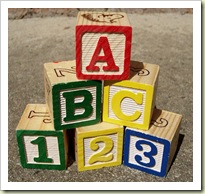By the time most children reach 10 months they can tell us they’re hungry, they’re tired, they’re happy, some can walk and some are already using words to communicate, but how much do we know about what’s really going on in their head? Most of us have been taught that babies start out knowing very little, but is that really the case?
According to a study done by University of Missouri researcher Kristy VanMarle, an assistant professor in the Department of Psychological Sciences in the College of Arts and Science, long gone may be the days when we think of babies as blank slates.
|
Kristy VanMarle, Assistant Professor in the Department of Psychological Sciences. |
New research at the University of Missouri has determined that the ability to quantify – even things that are hard to quantify, such as liquid – may develop much sooner than most parents realize.
VanMarle has recently determined that contrary to what previous studies have shown, infants are able to measure non-cohesive substances – like sand, water, or even Cheerios – as early as 10 months.
VanMarle and her team tested the quantifying skills of babies by presenting infants with two opaque cups: one containing a small amount of food, and one containing a larger amount. Consistently, the babies chose the larger amount, as long as that amount was substantially more than the smaller amount.
 “Several studies throughout the last 15 years have shown that infants are very good at telling how many objects they see; however, infants didn’t seem to count things like water or sand,” VanMarle said. “What we’re saying is that they can quantify substances; it’s just much harder. The infants can see how much food goes into each cup and compare that in their memories. They decide which amount is larger, and they almost always select the larger one.”
“Several studies throughout the last 15 years have shown that infants are very good at telling how many objects they see; however, infants didn’t seem to count things like water or sand,” VanMarle said. “What we’re saying is that they can quantify substances; it’s just much harder. The infants can see how much food goes into each cup and compare that in their memories. They decide which amount is larger, and they almost always select the larger one.”
This information further refutes the long-held idea that babies are “blank slates that know nothing of the world,” VanMarle said. 
In the future, VanMarle says this kind of study could be linked to a child’s progress in math-related skills, although she says that programs marketed to increase those abilities, such as “Baby Einstein,” still have mixed reviews when it comes to scholarly study and results.
“We know a great deal about infant’s perceptual abilities from very early on, even before birth, really,” VanMarle said. “We know that babies prefer high-contrast images, for example, because they can see them better. But whether or not those types of programs actually confer any intellectual benefit – I think the research is not really clear.”
Watch a video example of VanMarle’s work here: http://vimeo.com/17371791
Source: Adams, Steven “MU Researcher Studies How Infants Compare Quantities “ 1 Dec, 2010. University of Missouri News Bureau Website. 1 Dec, 2010. http://munews.missouri.edu/news-releases/2010/1201-mu-researcher-studies-how-infants-compare-quantities/








